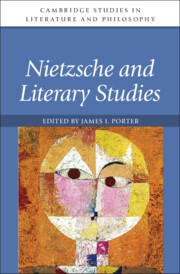Book contents
- Nietzsche and Literary Studies
- Cambridge Studies in Literature and Philosophy
- Nietzsche and Literary Studies
- Copyright page
- Contents
- Contributors
- Abbreviations
- Introduction
- 1 Heraclitus’ Clarity
- 2 Ariadne, or the Mediation of the Image
- 3 Nietzsche’s Centaurs
- 4 Nietzsche on the Task of the Poets in His Middle Writings
- 5 Some Images in Nietzsche’s Zarathustra
- 6 Nietzsche Ludens
- 7 Nietzsche and French Literature from the End of the Nineteenth Century to 1914
- 8 Ecce Mann
- 9 Plant Imaginaries and Human Existence in Nietzsche and Sartre
- 10 The Resources of the Figure
- 11 Nietzsche and Jewish Survival between Sarah Kofman and Jacques Derrida
- Editions and Translations of Nietzsche’s Works
- References
- Index
10 - The Resources of the Figure
Literary Discourse and the Critique of Religious Asceticism in Nietzsche’s Later Works
Published online by Cambridge University Press: 03 May 2024
- Nietzsche and Literary Studies
- Cambridge Studies in Literature and Philosophy
- Nietzsche and Literary Studies
- Copyright page
- Contents
- Contributors
- Abbreviations
- Introduction
- 1 Heraclitus’ Clarity
- 2 Ariadne, or the Mediation of the Image
- 3 Nietzsche’s Centaurs
- 4 Nietzsche on the Task of the Poets in His Middle Writings
- 5 Some Images in Nietzsche’s Zarathustra
- 6 Nietzsche Ludens
- 7 Nietzsche and French Literature from the End of the Nineteenth Century to 1914
- 8 Ecce Mann
- 9 Plant Imaginaries and Human Existence in Nietzsche and Sartre
- 10 The Resources of the Figure
- 11 Nietzsche and Jewish Survival between Sarah Kofman and Jacques Derrida
- Editions and Translations of Nietzsche’s Works
- References
- Index
Summary
In Allegories of Reading, Paul de Man contends that literature as “the language most explicitly grounded in rhetoric” (109) is key to understanding Nietzsche’s critique of metaphysics. De Man’s argument relies upon his observation that, for Nietzsche, the rhetorical figure is the paradigm of all language, and yet his efforts to show that literature models the kind of truth to which philosophy aspires neglects what is perhaps the most crucial aspects of Nietzsche’s critique of metaphysics – namely, the polemic Nietzsche launches in his final works against so-called Judeo-Christianity. What light does this polemic shed on the relationship between literature and philosophy in Nietzsche? Conversely, how does a reading attentive to the figurality of language change our understanding of this polemic?
The highly rhetorical nature of texts such as Twilight of the Idols, The Anti-Christ, and Ecce Homo has led scholars consistently to downplay their significance, or even to suggest they display signs of an encroaching madness. By contrast, I argue that the identifiably rhetorical and literary aspects of his 1888 polemic against Judeo-Christianity furnish the basis for understanding why Nietzsche describes the revaluation of all values as his “formula for an act of humanity’s highest self-examination (Selbstbesinnung)” (KSA 6, 365). The polemic in question takes aim at the paradox Nietzsche lays bare at the end of On the Genealogy of Morals. This paradox consists in the fact that the metaphysical belief in truth is simultaneously the essence of the ascetic ideal as well as what remains, or what is left over, once this ideal has been eradicated. But how can it be that the essence of the ascetic ideal survives its own eradication, that this ideal disappears and yet somehow remains in effect? Twilight of the Idols is Nietzsche’s attempt to articulate this dilemma in terms of the problem of belief.
In it Nietzsche frames the act of philosophizing with a hammer as doing battle with “eternal idols” – where the adjective “eternal” specifies that the idols in question survive their own destruction – and he insists that exposing the hollowness or fictive character of idols “does not stop them from being most fervently believed” (KSA 6, 58). Twilight thereby shows that a thoroughgoing critique of metaphysics does not necessarily free us from its “crudely fetishistic mindset.” And it raises the possibility that philosophical discourse is no less fictive than literary discourse. In line with this, The Anti-Christ and The Case of Wagner can and must be reinterpreted as sites in which Nietzsche rigorously reflects upon and puts to work the inherently fictive character of his own philosophical discourse. I shall argue that The Anti-Christ in particular reveals the inadequacy of de Man’s definition of Nietzschean philosophy as an “endless reflection on its own destruction at the hands of literature” (Allegories, 115) and moreover that it indicates at least one sense in which philosophy as self-examination is not reducible to the revaluation of values.
- Type
- Chapter
- Information
- Nietzsche and Literary Studies , pp. 230 - 249Publisher: Cambridge University PressPrint publication year: 2024

